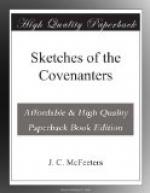* * * * *
Points for the class.
1. What was the condition of the Presbyterian Church during 1560-1570?
2. How did the Church thereafter decline?
3. To what did the Church resort for her reviving?
4. What effect had the Covenant on the Church?
5. Mention some of the main points in the Covenant.
6. How did the king regard the Covenant?
7. How was his opposition resisted by the Covenanters?
8. In what way do the former Covenants bind the present generation?
VII.
Contending with the king—A.D. 1582.
The Covenanted Church flourished under the care of the General Assembly like a well-watered garden. The small band of ministers and elders, who had organized the Assembly, were richly blest in their labors. They had assembled at the risk of their lives to give the supremacy of Jesus Christ its loudest utterance, and the unity of the Church its grandest expression; and the signal favor of God was their reward. The first ten years of the General Assembly were the halcyon days of the Presbyterian Church of Scotland. Under the showers of the Holy Spirit, pious people sprang up “as among the grass, as willows by the water-courses.” The power of the Papacy was broken and its horrors checked.
The clear sky, however, soon gathered blackness. The first cloud was, in size, and in cunning, too, as a man’s hand. The national government had condemned Popery as a religion, and had confiscated the vast wealth which the priesthood had amassed and had long enjoyed. This immense property, including rich revenues, large buildings, broad fields, and annual harvests, was held for distribution. How shall it be distributed? That was the burning question of the day, and it started a conflagration in the Church, that kindled many a fire at the stake. The Civil court decided that one-sixth should be given to the Church. The Church accepted the allowance. It was a sweet morsel in her mouth; but bitter, oh, how bitter in her bowels!
Regent Morton held the reins of government at that time. That cunning ruler in bestowing this gift expected large returns. If the Church get gold at his hand, she must make concessions on his demand. From that day the Covenanted Church was in trouble. She was compelled to keep up a constant warfare for her heaven-given independence, a bitter fight at the cost of much blood for the right of self-government under her Lord. The Bride of the Son of God had linked arms with an earthly suitor, and leaned on him for support, to her shame and sorrow. The Church of Christ, free-born and independent, endued with divine power, enriched with the indwelling Spirit, and sufficiently resourceful for all conditions and obligations, now depended on the State for financial help. The mistake grew more evident, and its correction more difficult, as time rolled on.




